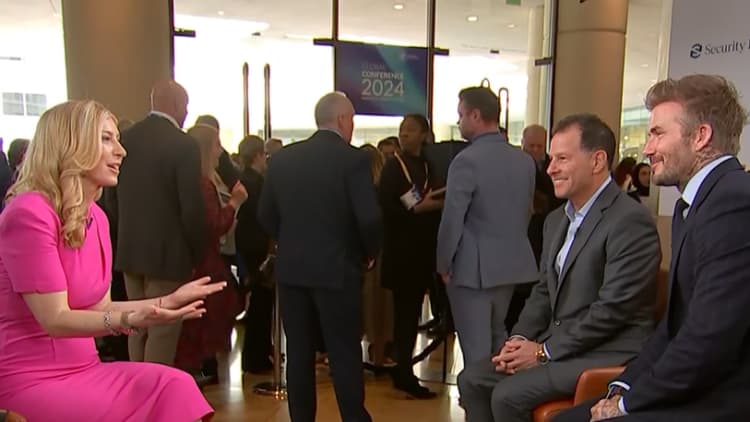Football fans are seen at the Hamad international Airport ahead of the 2022 FIFA World Cup.
Anadolu | Anadolu | Getty Images
For consumers who are continuing to spend on high-end experiences, whether that’s traveling to Europe to see Taylor Swift or splurging on premium airfare, what promises to be the biggest sporting event to ever take place in North America will provide plenty of options.
The 2026 FIFA World Cup, which will be jointly held by the U.S., Canada, and Mexico, will have the largest hospitality program in the history of sports, according to On Location CCO Scott Jernigan, which will range from stadium suites and hospitality villages to exclusive food and entertainment experiences.
FIFA selected On Location to be the exclusive hospitality provider for the event, which will take place from June 11 to July 19, 2026. It will be the largest World Cup ever held, hosted across 16 cities in the three countries and featuring 104 matches from 48 teams.
“In the United States there’s a big demand for unique experiences and curated moments — sports tourism is booming,” Jernigan said.
On Location has been a big part of that push into higher-end experiences around sporting events. Launched in 2015 by the NFL to sell hospitality packages for the Super Bowl, it was acquired by global sports and entertainment company Endeavor in 2020 in a $660 million deal. The company now sells hospitality and ticket packages to NCAA, UFC, MLB and PGA of America events, among others.
In 2021, On Location landed its biggest deal yet: a $1.3 billion deal with the IOC for the exclusive rights to manage the hospitality and experience packages for the next three Olympic Games, which includes Paris 2024 and Los Angeles 2028.
Jernigan, who is in Paris for the Games, said some of what On Location is seeing there will mirror what happens with the World Cup, as people from 120 different countries have bought different hospitality packages.
Roughly seven million tickets are expected to be available for the 2026 World Cup, and approximately one million premium tickets will be sold as part of hospitality packages. While what those offerings will include and the exact pricing are yet to be determined, Jernigan said the company is looking to “curate the experiences through the local markets” with unique food and entertainment options to match that.
On Location also tapped Major League Soccer to help with the promotion and sale of these packages, looking to lean into the league’s soccer expertise, according to Jay Berhalter, MLS executive vice president of business development.
Berhalter noted that MLS not only has clubs in each of the 11 U.S. markets and two Canadian markets being used during the World Cup, but also five of its clubs play in the same stadium, providing the league and On Location insight into the kinds of high-end experiences that soccer fans are looking for.
“The soccer fan is like other fans you’re seeing across the entertainment space, which is that they want incredible experiences, and they want something different and unique,” Berhalter said. “We think the World Cup is the ultimate expression of the sport and it’ll be an incredible opportunity for the fans to experience it — we can give them something that’s never been done before.”

In the wake of the chaos that surrounded the Copa America tournament, which saw fans rush the gates at Hard Rock Stadium in Miami, ultimately resulting in not only a delayed start to the final match but also injuries and arrest, there has been some concern about what will happen during the World Cup. However, FIFA, On Location and MLS were not involved in the hosting of that event, and South American soccer federation CONMEBOL and stadium organizers have blamed each other for security lapses, which Reuters reported fell below the standards of other big sporting events held in the U.S., like the Super Bowl.
FIFA has said it expects to generate $3.1 billion from hospitality rights and ticket sales during the 2023-2026 World Cup cycle, the bulk of which will come from the 2026 tournament. In comparison, FIFA reported $949 million in revenue spanning 2019 to 2022, which included the 2022 FIFA World Cup in Qatar. During that tournament, which had 64 matches, FIFA said it generated $243 million from hospitality package sales. Match Hospitality, which had sold hospitality packages for FIFA dating back to 2010, oversaw that event.
Jernigan said that hospitality packages for the 2026 World Cup will likely go on sale by the end of the year.
“The market in North America will be massive for this, but we’re looking forward to bringing the world to each of these host cities,” he said.
Disclosure: CNBC parent NBCUniversal owns NBC Sports and NBC Olympics. NBC Olympics is the U.S. broadcast rights holder to all Summer and Winter Games through 2032.

